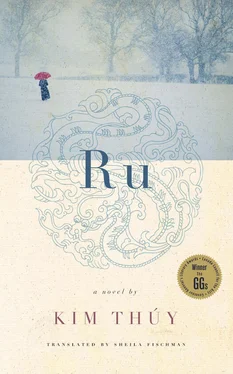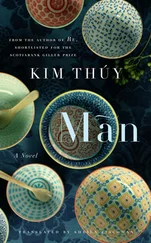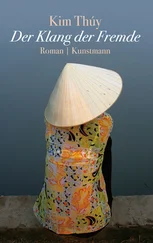Wyatt was smitten with the ao dài because that outfit makes women’s bodies look gorgeously delicate and tremendously romantic. One day he took me to a grand villa hidden behind rows of kiosks built on the ground where the garden had once stood. The villa was home to two aging sisters who were quietly selling off their furniture to collectors to ensure their day-to-day survival. Wyatt was their most faithful customer, so we were invited to recline on a big mahogany daybed like the one my paternal grandfather had, resting our heads on the ceramic cushions where opium smokers once lay. The owner brought us tea and slices of candied ginger. A slight breeze lifted the tails of her ao dài when she bent over to set the cups between Wyatt and me. Although she was sixty years old, the sensuality of her ao dài touched us. The one square centimetre of skin that was revealed mocked the ravages of time: it still made our hearts leap. Wyatt said that the diminutive space was his golden triangle, his isle of happiness, his own private Vietnam. Between sips of tea he whispered: “It stirs my soul.”
When soldiers from the North arrived in Saigon, they too were stirred by that triangle of skin. They were troubled by the schoolgirls in white ao dàis , bursting out of their school like butterflies in spring. And so wearing the ao dài was soon forbidden. It was banned because it cast aspersions on the heroism of the women in green kepis who appeared on enormous billboards at every street corner, in khaki shirts with sleeves rolled up on their muscular arms. They were right to banish the outfit. It took three times as long to button it than to take it off. One brisk movement was enough to make the snap fasteners pop open. My grandmother took not three but ten times longer to put on the tunic, because after giving birth to ten children her body had to be sculpted, redrawn with a girdle that had thirty hooks and eyes, to respect the cut of that hypocritically modest and deceptively candid garment.
Today, my grandmother is a very old woman, but still beautiful, lavishly so, like a queen. When she was in her forties, sitting in her parlour in Saigon, she epitomized a whole era of an extreme kind of beauty, of opulence. Every morning a cohort of merchants waited at the door to present their finds to her. Most of them already knew her requirements. They brought new crockery, plastic flowers just arrived from Europe and, inevitably, brassieres for her six daughters. As the country was at war, and the market unstable, it was best to anticipate everything. Sometimes it was diamonds. All the Vietnamese women in our circle had a loupe for examining diamonds. I had learned very young to spot inclusions in diamonds, because it was a skill necessary for dealing with family finances. As the banking system was weak and transitory, women had to master the art of buying and selling gold and diamonds to manage their savings. My grandmother spent days at a time running errands without ever moving. In the midst of the sellers’ visits, she also entertained friends or interviewed servants looking for work.
My grandmother’s days were filled with these mundane tasks. And while she was a believer, she didn’t have time to sit in front of Buddha. After the markets had been cleaned out of merchandise and merchants, after her Communist tenants had taken the contents of her safe and her lace scarves, she learned to dress in the long grey kimono worn by the faithful. Despite her salt-and-pepper hair, which she quite simply smoothed and tied into a bun just above the nape of her neck, she was still stunningly beautiful. She said her prayers at all hours of the day, in the smoke of incense sticks, waiting for word from her children who’d gone to sea. She’d let her two youngest, a boy and a girl, leave with my mother despite the uncertainty. My mother asked my grandmother to choose between the risk of losing her son at sea and that of finding him torn to shreds in a minefield during his military service in Cambodia. She had to choose secretly, without hesitating, without trembling, without perspiring. Perhaps it was to control her fear that she started to pray. Perhaps it was to become intoxicated with the incense smoke that she no longer left the altar.
In Hanoi, I had a neighbour across the street who also prayed every morning, at dawn, for hours. Unlike my grandmother’s, though, her windows made of bamboo slats opened directly onto the street. Her mantra and her steady and incessant pounding on her block of wood intruded on the whole neighbourhood. At first I wanted to move, lodge a complaint, even steal her bell and smash it to bits. After a few weeks, though, I stopped cursing the woman because I was haunted by the image of my grandmother.
During the first years of immense upsets, my grandmother sometimes took refuge in temples. She wanted so badly to hide in them that she even allowed Aunt Seven to drive her. Aunt Seven didn’t know how to drive a moped, because no one had shown her, and also because she wasn’t supposed to leave the house. But the rules had been rewritten since the structural upheaval of her life and of life in general. For my handicapped aunt, that bursting of the family nucleus brought a kind of freedom, as well as an opportunity to grow up. The situation led her to start up the one moped that was left in the courtyard. My grandmother got on, and my aunt began to drive and drive, never changing speed, never stopping, even at red lights. She told me later that when she saw a traffic light she closed her eyes. As for my grandmother, she put her hands on her daughter’s shoulders and prayed.
I would have liked Aunt Seven to tell me about how she had given birth while with the nuns. I don’t know if she’s aware that Aunt Four’s adopted son is actually hers. I don’t know how I knew. Maybe because the children listened through keyholes without the adults noticing. Or because adults aren’t always aware that children are present. The parents didn’t need to keep an eye on their children; they counted on the nannies to supervise them. But parents sometimes forgot that the nannies were young girls: they too had urges, they liked to attract the eyes of the chauffeur, the smile of the tailor, they liked to dream for a moment, as they looked at themselves in the mirror, that they too were part of the backdrop reflected there.
I always had nannies, but they sometimes forgot me. And I don’t remember any of them, even if I often find them in a corner, out of focus, in the photos from my childhood.
My son Pascal also lost all memory of his nanny, Lek, very soon after we left Bangkok to come home to Montreal. Yet his Thai nanny had been with him seven days a week, twenty-four hours a day, for more than two years, except for a few days’ holiday now and then. Lek loved Pascal from the very first moment. She showed him off in the neighbourhood as if he were hers, the most beautiful, the most magnificent. She loved him so much I was afraid she’d forget that inevitably they would separate, that someday we were going to leave her and, sadly, my son might not remember her at all.
Lek knew just a few words of English and I a few words of Thai, but all the same we managed to have long conversations about the residents of my building. The most cinematic image was that of the ninth-floor neighbour, an American in his thirties. One night he came home from work to find his apartment covered with feathers and moss. His pants had been cut in two lengthwise, his sofas ripped open, his tables lacerated by a knife, his curtains torn to shreds. All this damage was the work of the mistress he’d dismissed after three months of service. He shouldn’t have exceeded the limit of one month, because the hope of a great love grew in her mind every day, even though she continued to be paid every Friday for her loving. To avoid a disappointment on that scale, perhaps he shouldn’t have invited her to all those meals where she smiled without understanding anything, where she was a decoration for the table, where she swallowed vichyssoise while intensely craving a salad of green papaya with bird chilies that tore your mouth apart, that burned your lips, set fire to your heart.
Читать дальше












